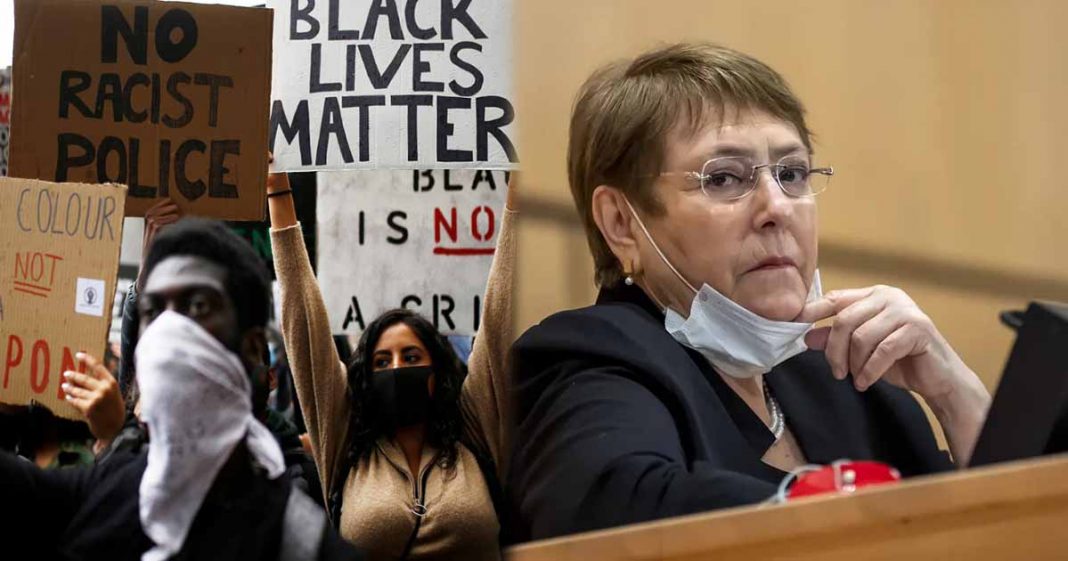The UN’s human rights chief urged countries Wednesday to confront the legacy of slavery and colonialism and to make amends for “centuries of violence and discrimination” through reparations.
Addressing an urgent debate on racism and police brutality at the UN Human Rights Council in Geneva, Michelle Bachelet called on countries to examine their pasts and to strive to better understand the scope of continuing “systemic discrimination”.
Systemic racial discrimination extends beyond any expression of individual hatred. It results from bias in multiple systems and institutions of public policy, which separately and together perpetuate and reinforce barriers to #equality.
📺 https://t.co/QmhqF0qNwk#FightRacism
— Michelle Bachelet (@mbachelet) June 17, 2020
UN says make reparations for slavery and colonialism
She pointed to the “gratuitous brutality” on display in the killing of George Floyd, a 46-year-old black man who died in Minneapolis in the US on May 25 after a white police officer — since charged with murder — kneeled on his neck for nearly nine minutes.
This symbol of “systemic racism… has become emblematic of the excessive use of disproportionate force by law enforcement, against people of African descent, against people of colour, and against indigenous peoples and racial and ethnic minorities in many countries across the globe,” she said.
“Behind today’s racial violence, systemic racism and discriminatory policing lies the failure to acknowledge and confront the legacy of the slave trade and colonialism,” she said.
Read more: UN asks the US to end its ‘structural racism’ amid worldwide anger
She stressed the need to “make amends for centuries of violence and discrimination, including through formal apologies, truth-telling processes, and reparations in various forms.”
Systemic racism in the US
Wednesday’s urgent council debate was called in response to Floyd’s killing, which was caught on amateur video, sparking worldwide demands to address systemic racism in the United States and around the world.
African countries are calling for the council to ask Bachelet and other UN rights experts to investigate racism and policy brutality in the US, but potential support for their draft resolution is unclear.
"We owe it to #GeorgeFloyd and all victims of racial discrimination and police brutality to dismantle racist institutions.”@Atayeshe and other @UN officials are calling for an end to systemic racism: https://t.co/lSbjXKWV2I
via @UN_News_Centre #BlackLivesMatter
— UNFPA (@UNFPA) June 15, 2020
The US itself withdrew from the council two years ago, but a number of its allies are uncomfortable with the country being singled out in the text, according to observers of the process.
Bachelet herself did not speak out specifically in favour of the draft resolution, but she did stress the need for “decisive reforms”.
She insisted on the importance of making clear that “black lives matter. Indigenous lives matter. The lives of people of colour matter.”
“All human beings are born equal in dignity and rights: that is what this Council, like my office, stands for.”
Slavery and colonialism still haunt the US; minorities take a stand
George Floyd’s shocking death in police custody has prompted many minority communities across the country to begin reflecting on their role in combating systemic racism. US minorities have been forced to rethink their position on the issue of racism in their adopted country, and have been a sizeable part of the protests that have enveloped the United States.
Read more: US minorities taking a lead role in anti-racism efforts
The posters began appearing at protests rocking the United States, all with the same message of support — Arabs, Latinos and South Asians for “Black Lives Matter.”
Many argue that this reckoning must also include acknowledgement of colorism — discrimination against black or dark-complected members of their own communities.
“It was not the coronavirus pandemic that killed George Floyd,” said Benjamin Crump, who is representing Floyd’s family. “It was that other pandemic. The pandemic of racism and discrimination.”
Read more: Floyd death will not be in vain: civil rights leader
Floyd’s death has reignited long-felt anger over police killings of African-Americans and unleashed a nationwide wave of civil unrest unlike any seen in the US since Martin Luther King Jr’s 1968 assassination.
With marches for racial justice stretching beyond the US and around the world, Sharpton said Floyd’s death would not be in vain.
“It’s time for us to stand up in George’s name and say get your knee off our necks,” said the 65-year-old Baptist minister.
Trump signs police reform order
US President Donald Trump on Tuesday signed an executive order on police reforms that he said would deliver “elegant justice” as the nation is roiled by protests over the killing of black citizens by police.
The presidential directive provides funding incentives for police departments nationwide to include a ban on choke holds, extra training on guidelines for the use of force, and a database of officers who have engaged in misconduct.
Read more: Trump signs police reform order
“We have to break old patterns of failure,” Trump said shortly before signing the order in the Rose Garden in front of uniformed police officers.
Senate Minority Leader Chuck Schumer said that while Trump “has finally acknowledged the need for policing reform,” more action must be taken.
The order states that “particularly in African-American communities, we must redouble our efforts as a nation to swiftly address instances of misconduct” by police.
This may signify a step towards the UN request for acknowledging making reparations for slavery and colonialism, which has been a huge part of American history.
AFP with additional input by GVS News Desk
What are your views on this? Share with us in the comments bar below.














